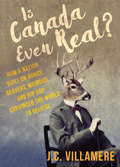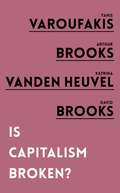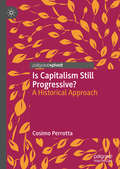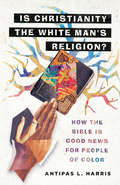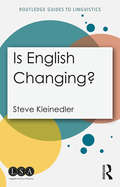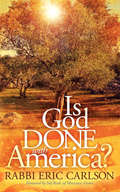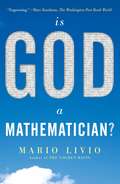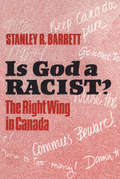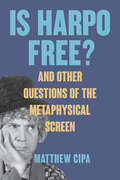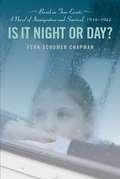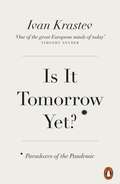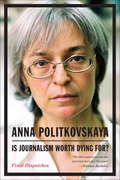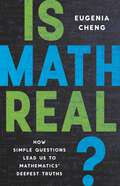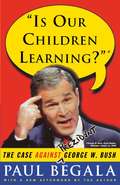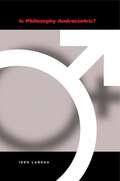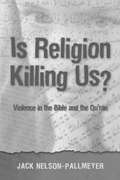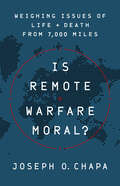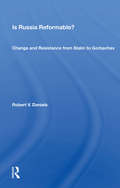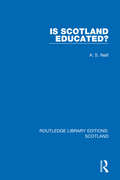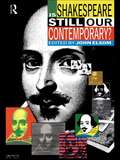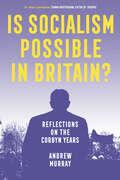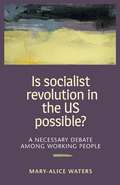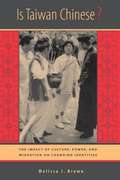- Table View
- List View
Is Canada Even Real?: How a Nation Built on Hobos, Beavers, Weirdos, and Hip Hop Convinced the World to Beliebe
by J. C. VillamereThis quirky ode to a quirky land is a humorous nostalgia trip and a fun Canadian history lesson couched in a hipster quiz book. If you’ve ever wondered Why is the inuksuk more revered than Wheelchair Jimmy? Does the iconic beaver really represent us better than The Littlest Hobo? Is everyone going canoeing without me or is canoeing way less of a thing than it’s made out to be? then this book is for you. Is Canada even real? It’s a question that’s being asked more and more, thanks to our waterproof, see-through, supposedly maple-scented currency and our improbably hot prime minister’s assertion that Santa lives here. In the age of Google Maps and #factcheck, how could the existence of Canada be questioned? And yet how could a nation that’s the home of toboggans, Drake, and KD exist in the same realm as, say, Belgium or Niger? Is Canada Even Real? examines the cultural factors behind the twenty-first-century monolithic myth of Canada, a nation that is lovable and real — if only in your imagination.
Is Capitalism Broken?
by David Brooks Arthur Brooks Yanis Varoufakis Katrina vanden Heuvel'We need to organise politically to defend the weak, empower the many and prepare the ground for reversing the absurdities of capitalism.' – Yanis Varoufakis 'Capitalism over the past twenty-five years has been an incredible moral good.' – David Brooks The Munk debate on capitalism There is a growing belief that the capitalist system no longer works. Inequality is rampant. The environment is being destroyed for profits. In some western nations, life expectancy is even falling. Political power is wielded by wealthy elites and big business, not the people. But for proponents of capitalism, it is the engine of progress, not just making all of us materially better off, but helping to address everything from women&’s rights to political freedoms. We seem to stand at a crossroads: do we need to fix the system as a matter of urgency, or would it be better to hold our nerve?
Is Capitalism Still Progressive?: A Historical Approach
by Cosimo PerrottaThe economic crisis of 2007/2008 has prompted much debate as to what caused it and what remedies may be implemented in order to regain a healthy economy. This book addresses these issues through the lens of capitalism with a focus on labour economics, arguing that capitalism, and the employment of young people and migrants, may be a suitable antidote to the ongoing political crises in Europe that are taking place as a result of the financial crisis.Using economic history and the history of economic thought to inform debate, Is Capitalism Still Progressive?: A Historical Approach will be of interest to policy makers (especially in emerging countries), students and researchers interested in exploring the pros and cons, and persistence, of the capitalist system.
Is Christianity the White Man's Religion?: How the Bible Is Good News for People of Color
by Antipas L. HarrisAmong many young people of color, there is a growing wariness about organized religion and Christianity in particular.Is Christianity the White Man's Religion?
Is English Changing? (Routledge Guides to Linguistics)
by Steve KleinedlerIs English changing? To what degree is it changing? Is this change good or bad? In answering these questions, Is English Changing? provides a lively and concise introduction to language change, refuting commonly held misconceptions about language evolution as we understand it. Showing that English, like all living languages, has historically changed and continues to change, this book: analyzes developments in the lexicon, the way words are spoken or written, and the way in which speakers and writers use words; offers a basic overview of the major subfields of linguistics, including phonetics, morphology, syntax, semantics, pragmatics, and sociolinguistics, all viewed through the prism of language change; discusses change over time with examples from Old English, Middle English, and Modern English; reinforces important concepts with examples from other languages, including Spanish, Japanese, and Czech; clearly defines key terms and includes advice on rules, usage, and style, as well as ample annotated further reading and activities throughout. Aimed at undergraduate students with little or no prior knowledge of linguistics, this book is essential reading for those studying this topic for the first time.
Is God Done with America?
by Rabbi Eric CarlsonFrom the founder of a messianic congregation: A powerful call to fulfill America&’s destiny by breaking down the barriers between Jews and Gentiles. America, drifting away from God and in a grave moral crisis, stands at a major spiritual crossroads. The truth of how this nation was founded and what its founders believed is being suppressed. Is America a Christian nation? Were America's founders Christians? Does America have a prophetic destiny? If so, will America fulfill that destiny? These questions and more are answered by Rabbi Eric Carlson in Is God Done with America? Based upon the &“One New Man&” of Ephesians 2:15, America&’s spiritual DNA was established through a prayer spoken by the founding colonists of the Jamestown Settlement in Virginia—the birthplace and spiritual root of America. A portion of this prayer, exactly as it was written and quoted from the book Lawes Divine, Morall and Martiall for the Colony of Virginea, printed in the year 1612, was spoken twice daily: &“And call in the Jewes together with the fulnesse of the gentiles, that thy name may be glorious in al the world, the dayes of iniquity may come to an end, and we with all thine elect people may come to see thy face in glorie, and be filled with the light thereof for evermore.&” This prayer not only reveals a portion of Americas prophetic destiny, it is key to the restoration of contemporary America&’s dying church. Is God Done with America? contains critical information regarding Jewish revival, the restoration of signs and wonders to the body of Messiah, and the reconciliation of Messianic Jews and Christians into one unified body.
Is God a Mathematician?
by Mario LivioBestselling author and astrophysicist Mario Livio examines the lives and theories of history’s greatest mathematicians to ask how—if mathematics is an abstract construction of the human mind—it can so perfectly explain the physical world.Nobel Laureate Eugene Wigner once wondered about “the unreasonable effectiveness of mathematics” in the formulation of the laws of nature. Is God a Mathematician? investigates why mathematics is as powerful as it is. From ancient times to the present, scientists and philosophers have marveled at how such a seemingly abstract discipline could so perfectly explain the natural world. More than that—mathematics has often made predictions, for example, about subatomic particles or cosmic phenomena that were unknown at the time, but later were proven to be true. Is mathematics ultimately invented or discovered? If, as Einstein insisted, mathematics is “a product of human thought that is independent of experience,” how can it so accurately describe and even predict the world around us? Physicist and author Mario Livio brilliantly explores mathematical ideas from Pythagoras to the present day as he shows us how intriguing questions and ingenious answers have led to ever deeper insights into our world. This fascinating book will interest anyone curious about the human mind, the scientific world, and the relationship between them.
Is God a Racist? The Right Wing in Canada
by Stanley R. Barrett‘God is a racist’—so goes a statement published in the literature of the Western Guard, a white-supremacist, anti-semitic group in Toronto. It is one of a number of racist organizations that have sprung up in Canada since the Second World War. Stanley Barrett points out in this disquieting study that although many of the principles of such organizations are offensive to the vast majority of Canadians, they represent a growing part of a broader political phenomenon that has recently surfaced in numerous nations. In examining the rise of right wing extremism in Canada, a nation with a traditional reputation for tolerance, Barrett considers a wide range of political convictions, from confessed fascists to essentially ordinary, law-abiding, but highly conservative individuals who are deeply concerned about the future of Western Christian civilization. Barrett’s study, grounded in a scientific tradition that has regularly exposed racial myths, is guided by humanist values that celebrate individual worth. It sheds new light on a growing phenomenon that threatens those values.
Is Harpo Free?: And Other Questions of the Metaphysical Screen (SUNY series, Horizons of Cinema)
by Matthew CipaIs Harpo Free? is a lively appreciation of film and television's ability to artistically explore concepts typical of philosophical metaphysics, such as free will, causality, and personal identity. Rather than using films and television programs as vehicles for philosophical arguments, the book instead celebrates the artistic ways in which they give life to various metaphysical concepts and how the artistic expression of these concepts and ideas helps us understand ourselves, the world, and our place within it. Through close analysis of a varied selection of works and their use of narrative, form, and style, Is Harpo Free? exemplifies a novel approach to appreciating the philosophical substance of films and television programs. Films and television programs discussed include A Night at the Opera; Run, Lola, Run; Shane; Harvey; Three Colours: Blue; The Americans; Dark; and Fargo.
Is It Just?
by Lori Chambers Jenny Roth Minnie SmithMinnie Smith's (ca. 1874-1933) feminist domestic novel, Is It Just?, is a harsh critique of the injustices perpetuated by male-dominated society and law. Published in 1911, it tells the tragic story of Mary Pierce, who, through the actions of her selfish and lazy husband, loses her land, her social standing, and ultimately her life.In Is It Just?, the conventions of the domestic novel - episodic presentation, stock characters, contrived plots, and romantic conclusions - illustrate the superiority of female values and argue for expanded social, political, and legal rights for women. A critical introduction by Jenny Roth and Lori Chambers frames Smith's specific references to the laws and social geography of British Columbia, situating the novel in relation to its historic and literary importance. This unique work of domestic literature adds to our limited library of Canadian feminist writings of the first wave.
Is It Night or Day?
by Fern Schumer ChapmanIn 1938, Edith Westerfeld, a young German Jew, is sent by her parents to Chicago, Illinois, where she lives with an aunt and uncle and tries to assimilate into American culture, while worrying about her parents and mourning the loss of everything she has ever known. Based on the author's mother's experience, includes an afterword about a little-known program that brought twelve hundred Jewish children to safety during World War II.
Is It Tomorrow Yet?: Paradoxes of the Pandemic
by Ivan KrastevA FINANCIAL TIMES BOOK OF THE YEAROne of our most scintillating public intellectuals explores the political paradoxes of the pandemic and helps us think our way through it'We are able to imagine anything because we are being besieged by something that was considered unimaginable...'Beneath the panic and bluster, beneath the confusing speeches and the conflicting advice, the Coronavirus pandemic acted, changing our world in the most profound ways. The tragic human cost and the economic devastation will be assessed and calculated for decades to come. But the pandemic also changed things in ways that are less easily expressed and understood. It has made bare the frayed contradictions of modern life. It has distorted things that seemed simple and settled. It has affirmed plain, uncomfortable truths. In this brilliant, thought-provoking essay, Ivan Krastev, one of our most interesting thinkers today, explores the pandemic's immediate consequences and conceives of its long-term legacy. Will things be different for the communities most harmed, and for those who escaped the worst? Where are we now with the US and China, with the UK and Europe? And how do we think our way through the unthinkable?
Is Journalism Worth Dying For? Final Dispatches
by Anna Politkovskaya Arch TaitA collection of final dispatches by the famed journalist, including the first translation of the work that may have led to her murder. Anna Politkovskaya won international fame for her courageous reporting. Is Journalism Worth Dying For? is a long-awaited collection of her final writing. Beginning with a brief introduction by the author about her pariah status, the book contains essays that characterize the self-effacing Politkovskaya more fully than she allowed in her other books. From deeply personal statements about the nature of journalism, to horrendous reports from Chechnya, to sensitive pieces of memoir, to, finally, the first translation of the series of investigative reports that Politkovskaya was working on at the time of her murder--pieces many believe led to her assassination. Elsewhere, there are illuminating accounts of encounters with leaders including Lionel Jospin, Tony Blair, George W. Bush, and such exiled figures as Boris Berezovsky, Akhmed Zakaev, Vladimir Bukovsky. Additional sections collect Politkovskaya's non political writing, revealing her delightful wit, deep humanity, and willingness to engage with the unfamiliar, as well as her deep regrets about the fate of Russia.
Is Math Real?: How Simple Questions Lead Us to Mathematics' Deepest Truths
by Eugenia ChengOne of the world&’s most creative mathematicians offers a &“brilliant&” and &“mesmerizing&” (Popular Science) new way to look at math—focusing on questions, not answers Winner of the Los Angeles Times Book Prize and a New Scientist Best Book of the Year Where do we learn math: From rules in a textbook? From logic and deduction? Not really, according to mathematician Eugenia Cheng: we learn it from human curiosity—most importantly, from asking questions. This may come as a surprise to those who think that math is about finding the one right answer, or those who were told that the &“dumb&” question they asked just proved they were bad at math. But Cheng shows why people who ask questions like &“Why does 1 + 1 = 2?&” are at the very heart of the search for mathematical truth. Is Math Real? is a much-needed repudiation of the rigid ways we&’re taught to do math, and a celebration of the true, curious spirit of the discipline. Written with intelligence and passion, Is Math Real? brings us math as we&’ve never seen it before, revealing how profound insights can emerge from seemingly unlikely sources.
Is Our Children Learning?: The Case Against George W. Bush
by Paul Begala"Is Our Children Learning?" examines the public life and public record of George W. Bush.
Is Philosophy Androcentric?
by Iddo LandauIn Is Philosophy Androcentric?, Iddo Landau contends that none of the arguments for viewing philosophy as pervasively androcentric ultimately stand up to rational scrutiny, while the ones that show it to be nonpervasively androcentric do not undermine it in the way that many critics have supposed. “Philosophy emerges, in almost all of its parts,” he concludes, “as human rather than male, and most parts and aspects of it need not be rejected or rewritten."
Is Religion Killing Us?: Violence in the Bible and the Quran
by Jack Nelson-PallmeyerNelson-Pallmeyer explores the ways in which the sacred texts of Christianity, Judaism, and Islam seemingly justify violence against enemies in the service of God's will. He challenges the understanding of power that lies at the heart of the Bible and the Quran, arguing that nonviolence is crucial to the future of humanity and that the abusive visions of power presented in sacred texts should be challenged.
Is Remote Warfare Moral?: Weighing Issues of Life and Death from 7,000 Miles
by Joseph O ChapaAmerica is at an important turning point. Remote warfare is not just a mainstay of post–9/11 wars, it is a harbinger of what lies ahead—a future of high-tech, artificial intelligence–enabled, and autonomous weapons systems that raise a host of new ethical questions. Most fundamentally, is remote warfare moral? And if so, why? Joseph O. Chapa, with unique credentials as Air Force officer, Predator pilot, and doctorate in moral philosophy, serves as our guide to understanding this future, able to engage in both the language of military operations and the language of moral philosophy. Through gripping accounts of remote pilots making life-and-death decisions and analysis of high-profile cases such as the killing of Iranian high government official General Qasem Soleimani, Chapa examines remote warfare within the context of the just war tradition, virtue, moral psychology, and moral responsibility. He develops the principles we should use to evaluate its morality, especially as pilots apply human judgment in morally complex combat situations. Moving on to the bigger picture, he examines how the morality of human decisions in remote war is situated within the broader moral context of US foreign policy and the future of warfare.
Is Russia Reformable?: Change And Resistance From Stalin To Gorbachev
by Robert V. DanielsHistory is always full of surprises as it unfolds before us. The Soviet Union, for decades a seemingly frozen monolith of totalitarian rigidity and paranoid bellicosity, suddenly finds itself under a leader in the person of Mikhail Gorbachev who calls for "radical restructuring," openness," and even a "revolution." Outsiders justly wonder if this m
Is Science Multicultural? Postcolonialisms, Feminisms, and Epistemologies
by Sandra HardingThis book explores what the last three decades of European/American, feminist, and postcolonial science and technology studies can learn from each other. Sandra introduces and discusses an array of postcolonial science studies.
Is Scotland Educated? (Routledge Library Editions: Scotland #21)
by A. S. NeillOriginally published in 1936, and with more than a slightly tongue-in-cheek tone at times, the author of this book declares that Scotland is not educated but merely learned. This book does not deal with education in its narrowest sense: it ranges from the Kirk to Haggis, Tartans and Burns, Whisky and repressed sex in its discussion, proclaiming Calvinism as the root of most of Scotland’s evils. Honest and at times provocative, this volume does give direct access to the emotional roots of Neill’s feelings about Scottish education.
Is Shakespeare Still Our Contemporary?
by John ElsomFirst published in 2004. Routledge is an imprint of Taylor & Francis, an informa company.
Is Socialism Possible in Britain?: Reflections on the Corbyn Years
by Andrew MurrayThe lessons of the Corbyn years for the future of left politicsIs Socialism Possible in Britain? analyses Jeremy Corbyn&’s tenure as Labour leader and the prospects for parliamentary socialism in a post-Corbyn Britain. Lively and insightful, it is informed by an insider&’s view of the most radical period in Labour&’s history. A veteran of the Stop the War Coalition, Andrew Murray was seconded to Corbyn&’s office from the Unite trade union and witnessed an extraordinary daily bombardment from sections of the Parliamentary Labour Party and the media. He candidly assesses the leadership&’s response to the antisemitism controversy and the dilemmas of Brexit, as well as Keir Starmer&’s restoration of a turgid neo-Blairism.The problems that beset Corbyn are likely to confront any similar political project. Is Socialism Possible in Britain? explores how they can be more effectively addressed in the future – a future which we must hope is not so far away.
Is Socialist Revolution in the Us Possible?: A Necessary Debate Among Working People
by Mary-Alice Waters Norton SandlerAn unhesitating "Yes"--that's the answer given here to the question, Is Socialist Revolution in the US Possible? Possible--but not inevitable. That future depends on us. This book is a contribution to the growing discussion among working people everywhere who are looking for a way forward in the face of sharpening capitalist crisis and spreading wars. Fighting for a society only working people can create, it is our own capacities we will discover, not the rulers' false image of us--an image that reflects their own guilt and fear.
Is Taiwan Chinese? The Impact of Culture, Power, and Migration on Changing Identities
by Melissa J. BrownIn a unique comparison of ethnographic and historical case studies drawn from both Taiwan and China, Brown's book shows how identity is shaped by social experience--not culture and ancestry, as is commonly claimed in political rhetoric.
